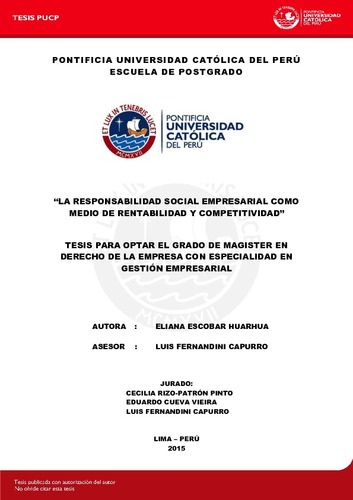| dc.contributor.advisor | Fernandini Capurro, Luis Augusto | |
| dc.contributor.author | Escobar Huarhua, Eliana | es_ES |
| dc.date.accessioned | 2016-05-24T15:54:52Z | es_ES |
| dc.date.available | 2016-05-24T15:54:52Z | es_ES |
| dc.date.created | 2015 | es_ES |
| dc.date.issued | 2016-05-24 | es_ES |
| dc.identifier.uri | http://hdl.handle.net/20.500.12404/6917 | |
| dc.description.abstract | La empresa ha sido creada con el fin de satisfacer las necesidades de las personas, he ahí el fundamento esencial de la Responsabilidad Social Empresarial (RSE), que en buena cuenta resulta ser el producto de las acciones y proyectos que realiza la empresa a favor de las personas y de su entorno, sin dejar de lado su fin lucrativo, razón por la cual planteamos que mediante la RSE también se puede generar rentabilidad integrando los fines primordiales de la empresa; generar utilidades y satisfacer plenamente las necesidades de la sociedad.
De este modo, en la primera parte de la tesis desarrollaremos la importancia que generó la presión de los grupos sociales frente a las acciones de la empresa, la intervención de organizaciones como la ONU para fijar parámetros de cuidado medioambiental y la iniciativa de empresarios para actuar responsablemente frente a su entorno, expondremos también las diversas teorías de RSE y la relación que existe entre ésta, el desarrollo sostenible e inversión responsable.
En el segundo capítulo se estudiará la correlación entre la RSE, rentabilidad y competitividad, mediante el enfoque financiero y la aplicación de métodos básicos para evaluar la rentabilidad de un proyecto de RSE, posteriormente se definirá el concepto de ventaja competitiva, su importancia y aplicación en la RSE, la gestión y estrategias para prevenir y corregir los impactos generados por la empresa hacia su entorno, ambos conceptos se relacionaran con la inversión en acciones y proyectos de RSE y la adecuada gestión de los mismos para generar rentabilidad y una ventaja competitiva diferenciadora, corroborando que mediante la RSE se puede obtener dinero y ser competitiva.
Finalmente en el tercer capítulo, se aplicaran los métodos financieros de evaluación de proyectos a la iniciativa ambiental de plantas de tratamiento de efluentes de la empresa pesquera TASA, mediante la cual demostramos cuantitativa y cualitativamente que la inversión en acciones de RSE integradas a los procesos productivos conducen a la rentabilidad de la empresa, asimismo se evalúa la gestión de RSE mediante la cual TASA se convierte en una empresa diferenciada y altamente competitiva dentro de su rubro. | es_ES |
| dc.description.abstract | The company has been created to satisfy the needs of the people, this is the foundation of the Corporate Social responsibility (CSR), which proves to be the product of the actions and projects developed by the company in favor of the society and the environment, without leaving his lucrative order, this is the reason why we propose that using CSR also can generate profitability, integrating the primary purposes of the company; generate profits and fully satisfy the needs of the society.
In the first chapter of the thesis will present the importance of the pressure generated by the different social groups over the company, as well as the intervention of organizations such as the ONU to set parameters of environmental care and the initiative of entrepreneurs to act responsibly with the environment. The different theories of CSR will be exhibit, the relationship between this, the sustainable development and responsible investment will be explained.
In the second chapter, the correlation between CSR, profitability and competitiveness was analyzed through the financial approach and the appliance of basic methods, in order to evaluate the profitable of projects in CSR, then we defined the competitive advantage concept, the importance and application of CSR, and we established different management strategies to prevent and correct the impacts generated by the company to the environment, relating these concepts to investment in shares and appropriate management in order to generate profitability, gain a distinctive competitive advantage and developing corporate reputation.
Finally, in the third chapter of this thesis, we evaluated the results of the methods applied to the effluent treatment plant of the fishing company TASA, which demonstrated quantitative and qualitatively that the investment in CSR, also demonstrating the importance of CSR management which helped the company to become highly differentiated and competitive within its field. | es_ES |
| dc.language.iso | spa | es_ES |
| dc.publisher | Pontificia Universidad Católica del Perú | es_ES |
| dc.rights | Atribución-NoComercial-CompartirIgual 2.5 Perú | * |
| dc.rights | info:eu-repo/semantics/openAccess | es_ES |
| dc.rights.uri | http://creativecommons.org/licenses/by-nc-sa/2.5/pe/ | * |
| dc.subject | Responsabilidad social de las empresas--Perú | es_ES |
| dc.subject | Derecho empresarial--Perú. | es_ES |
| dc.title | La responsabilidad social empresarial como medio de rentabilidad y competitividad | es_ES |
| dc.type | info:eu-repo/semantics/masterThesis | es_ES |
| thesis.degree.name | Magíster en Derecho Constitucional | es_ES |
| thesis.degree.level | Maestría | es_ES |
| thesis.degree.grantor | Pontificia Universidad Católica del Perú. Escuela de Posgrado | es_ES |
| thesis.degree.discipline | Derecho de la Empresa | es_ES |
| renati.discipline | 422337 | es_ES |
| renati.level | https://purl.org/pe-repo/renati/level#maestro | es_ES |
| renati.type | http://purl.org/pe-repo/renati/type#tesis | es_ES |
| dc.publisher.country | PE | es_ES |
| dc.subject.ocde | https://purl.org/pe-repo/ocde/ford#5.05.01 | es_ES |






